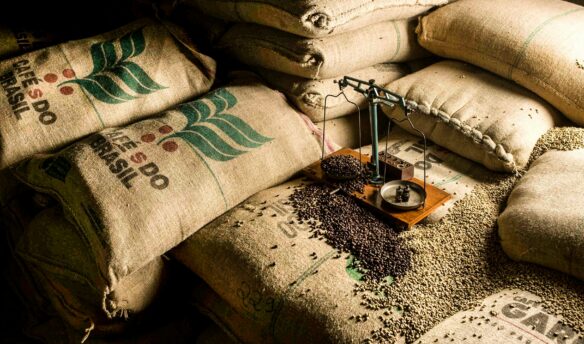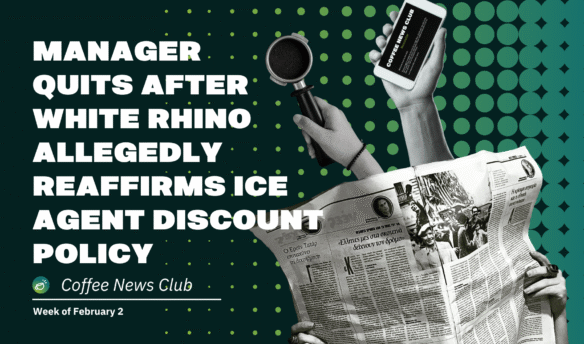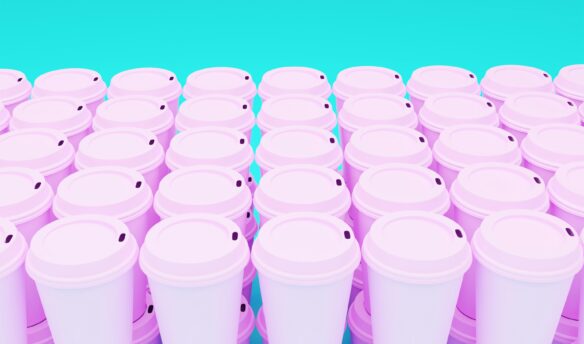Loyalty for thee but not for me. Peet’s gives a whole new meaning to loyalty cards, plus a heatwave in Brazil comes at the worst time, and a judge rules that Starbucks illegally withheld raises from unionized workers.
‘Heat Wave at End of Brazil’s Winter Raises Concerns for Coffee Crop’ – via Nasdaq
Winter in the Southern Hemisphere is coming to an end, and September heralds the first flowering of Brazil’s coffee trees—flower buds on a coffee plant mark the first stages of coffee cherry development. Coffee needs mild temperatures for its plants to flower, but the weather in Brazil is currently more than 20° Fahrenheit higher than usual for this time of year.
High temperatures in Brazil, according to Nasdaq, are “raising concerns among farmers and agronomists about the health of the coffee fields.” According to experts interviewed for the piece, “the extreme heat for this period of the year could negatively impact coffee fields that have had an early flowering, cutting the production potential for next year’s crop.”
However, any impact the temperature has on coffee production will take time to evaluate—the focus now is on upcoming rain patterns, which will influence the primary flowering season in October. This year’s heatwave has put more pressure on commodity coffee prices. In 2023, prices fell significantly after a relatively strong uptick in 2022.
Part of the reason temperatures are so high is because of the formation of a heat dome, “which occurs when a ridge of high pressure builds over an area and stays for days or even weeks, trapping hot air,” Nasdaq reports. In May, analysts predicted El Niño would also impact coffee production this year—the weather pattern has likewise caused temperatures to rise.
‘Starbucks Illegally Kept Wages, Benefits From Union Workers’ – via Bloomberg
A National Labor Relations Board (NLRB) administrative judge has ruled that Starbucks broke federal law when it raised wages and increased benefits for workers—just not unionized ones. The decision is the first nationwide ruling against the company since Starbucks Workers United started organizing two years ago.
A National Labor Relations Board judge ruled that Starbucks broke federal law when it raised wages and increased benefits for most workers but excluded extending benefits to unionized stores.
In August 2022, six months after the first union filing in Buffalo, New York, then-CEO Howard Schultz announced that Starbucks would raise wages for all non-unionized stores. Workers at these stores would also receive credit card tips and faster sick time accrual. These actions violated the National Labor Relations Act, according to Administrative Law Judge Mara-Louise Anzalone.
“[Starbucks] used its top executive to launch a corporate-wide effort to manipulate its employees’ free choice by conditioning their pay and benefits on their willingness to forgo organizing—a direct attack on the Act’s central goals,” Judge Anzalone said. The judge ordered Starbucks to reimburse thousands of unionized workers for lost wages and benefits.
Bloomberg notes that Starbucks is facing nearly 100 complaints for its anti-union activities, 75 of which are still pending. The company has denied all wrongdoing. In this case, Starbucks attorneys argued that the company couldn’t give raises to unionized stores because federal law prohibits changing benefits during the collective bargaining process. The union offered to waive this provision at the time, and Judge Anzalone “concluded [Starbucks’] argument wasn’t lodged in good faith,” Bloomberg reports
Read the full story here or via Yahoo! Finance here.
‘Peet’s Coffee Rewarding ‘Disloyal’ Customers With Free Drink for National Coffee Day’ – via Marketing Dive
You’ve heard of loyalty cards (“Buy ten drinks, get the next one free!”), maybe you’ve heard of disloyalty cards—or reward cards that allow patrons to accrue stamps/punches to their loyalty cards by going to different coffee shops, usually a tool or promotion used by local cafes to encourage patrons to frequent small businesses. Such cards are fun, welcoming and prioritize community over competition.
For National Coffee Day, Peet’s Coffee announced its own “Disloyalty Program,” but with some different rules. “To participate,” Marketing Dive reports, “consumers can create a rewards account with the brand via a microsite and upload a screen grab from a rival company’s loyalty app to be rewarded with a free drink from Peet’s. Brands it will accept loyalty points from include Dunkin’ and Starbucks, among others.” The offer was only valid on September 29th.
The campaign could perhaps be a response to Peet’s current position in the market: Marketing Dive notes that the brand is “reportedly losing market share to competitors and carrying significant debt.”
Disloyalty cards aren’t new: the first disloyalty card is generally attributed to Prufrock Coffee in London in 2009 but have since appeared in cities across England and Scotland in the United Kingdom. Small clusters of coffee shops in San Francisco and Washington, DC, have also successfully come together to launch their versions of disloyalty cards.
Peet’s accepted loyalty points from the following brands: Starbucks, Dutch Bros, Coffee Bean and Tea Leaf, Dunkin’, Tim Hortons, Better Buzz, Joe and the Juice, Bluestone Lane and The Human Bean. “We know that coffee people can be a bit promiscuous in their hunt for a great cup,” said Jessica Buttimer, Peet’s vice president of brand marketing, in a press release. “So, we wanted to reward them for their loyalty to the drink because, no matter where else you get your coffee, coffee people deserve great coffee.”
‘After Five Years Of Competition Coaching & Cafe Consulting, Glitter Cat Announces Closure’ – via Sprudge
Glitter Cat, an organization specializing in coffee competition coaching for under-represented communities, has closed. Started in 2018 by longtime barista competitor Veronica Pearl, Glitter Cat provided skill-building bootcamps, ongoing mentoring, and monetary support for dozens of baristas and coffee professionals. Over five years, 142 coffee professionals have been part of the Glitter Cat program—51 competed at the national level of the US Coffee Competitions, and 11 were finalists in their respective competitions.
The program initially started as a bootcamp for would-be barista competitors. It grew to include programming and coaching across multiple competitions, including bootcamps for the Brewer’s Cup, Coffee in Good Spirits, and Roasting competitions. During the pandemic, Glitter Cat expanded to offer virtual classes, host its own online competitions, and offer educational opportunities, including human resources training. The final stages of Glitter Cat’s shutdown will involve disclosing financial information in 2024.
“When the late Axel Cat and I started Glitter Cat, with the help, guidance, and support of our nearest and dearest, we hoped to help marginalized coffee professionals access a visible platform to share their stories,” Pearl wrote in an announcement. “We sought to create spaces where they felt seen, heard, and valued. Glitter Cat became far more than that. We became a safe space for humans to represent their authentic selves and fiercely belong to a group of misfits lovingly known as The Glitter Cats.”
More News
‘Federal Judge Approves Final $12 Million Settlement in Kona Labeling Case‘ – via Daily Coffee News
‘Just Look At This Automatic V60 Smart Brewer’ – via Sprudge
‘Expocacer Celebrates One Million Coffee Sacks Received‘ – via Global Coffee Report
‘Coffee Prices & Technology Summit’ Coming in October‘ – via Daily Coffee News
‘Hideo Kojima Productions Coffee Now Available‘ – via Siliconera
‘Take the 2023 Fresh Cup Reader Survey (We Need Your Perspective)‘ – via Fresh Cup Magazine
‘Design of Coffee’ Course Teaches Engineering through Brewing the Perfect Cup of Coffee‘ – via Daily Coffee News
The Week in Coffee Unionizing
Workers at the three-location board game cafe chain Hex & Co in New York City intend to unionize and have informed the company of this wish. Under new NLRB rules introduced to streamline the process, it is now down to the company to either voluntarily recognize the union or file for an election—previously, the onus fell on workers to petition for a vote.
The unit, represented by Workers United, comprises a supermajority of Hex workers—the company employs 75 people across baristas, bartenders, after-school program administrators, and even “dungeon masters” who run games. Workers are asking for a living wage, clearer opportunities for advancement within the company, and increased staffing.
“We’ve had coworkers and friends who have had to leave not only this job, but also New York, because they just couldn’t afford to stay,” said Hex employee Jace Alejo in a statement. “All we are asking for is to be recognized and properly supported by this company that we already give so much to.”
Restaurant Business Online also notes that the new unionization process allows the NLRB to unilaterally recognize a bargaining unit whatever the election results: “If the Board has found the employer has engaged in unfair labor practices of any sort leading up to the election, it can declare the union has prevailed, regardless of how employees voted.”
The Week in Corporate Coffeewashing
Starbucks received some positive press this week—they announced that they’ve developed six new “climate-change-resistant tree varietals.” The announcement is part of the company’s Global Coffee Week, which “celebrat[es] the power of community to create a limitless future of coffee.”
“We put our efforts up against the development of climate-resistant trees,” Starbucks’ executive vice president of global coffee, social impact and sustainability Michelle Burns told the Seattle Times. “Very specifically, developing new tree varietals in a way that ensures that they are more resistant to the impact of climate.”
Along with quotes from Starbucks, the Seattle Times piece also mentions the research funding gap problem, outlined by World Coffee Research in July 2023. In a white paper, the organization calls funding for agricultural research and development “shockingly low,” estimating that the industry needs another $452 million to invest in research over the next decade. In particular, the white paper notes the lack of investment from the private sector: 90% of funding for research comes from the public sector. Starbucks, a WCR member, made $32.3 billion in 2022.
Starbucks’ announcement also suggests there may be a new trend emerging: coffee companies developing their own coffee varieties. Starbucks’ agronomy program is open-source, meaning they say they’ll share new developments with farmers with “no strings attached.” Nespresso recently released an “exclusive” custom-designed variety called the N°20, which was “found to thrive best in the soil of the Cauca and Caldas regions of Colombia.”
N°20 has been in development for 20 years and is grown by 59 farmers in Colombia who collectively “planted and cared for one million coffee trees of this new and unique Arabica variety.” According to Nespresso, these farmers “are all part of the Nespresso AAA Program and were consequently paid a premium as a reward for their investment in sustainable high quality.” It’s unclear whether the farmers can sell coffee harvested from their N°20 plants to other buyers.
Beyond the Headlines
‘An Indecent Proposal: Should Coffee Be Regulated Like Alcohol?’ by Valorie Clark
‘A Conversation with the Authors of the 2023 Coffee Barometer’ by Nick Brown
‘The Wonderful Rio Coffee World Of Leonardo Gonçalves’ by Paulo Pedroso







